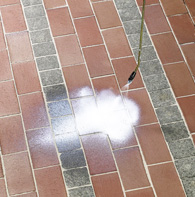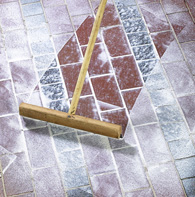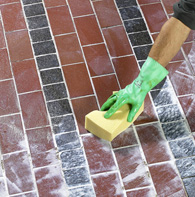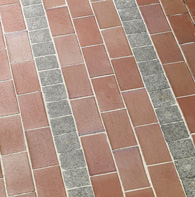Paving Jointing Sand Stabilisers - Online Shop
Paving Jointing Sand / Jointing Sand Stabilisers
Kiln-dried natural sand for unbonded block paving (so-called ‘flexible’ paving) with or without added integral polymer sand stabilisers.
Unbonded block paving (so-called ‘flexible’ paving) is the basic form of paving jointing, where the paving elements / blocks are laid directly on compacted sand and aggregate subbase, to which they are not bonded or bedded in a cement mortar. The blocks are laid butt-jointed, with no defined joint spacing to accommodate a subsequent paving jointing mortar. Instead, the joints in unbound paving are backfilled with fine sand that is compacted so far as is possible by vibrating compaction of the surface.
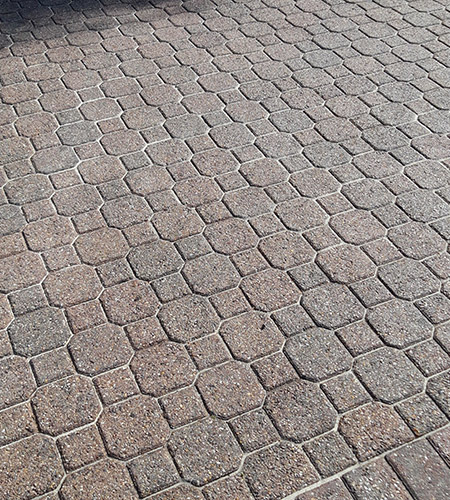
Concrete blocks that are ‘Butt-jointed’ for flexible unbound paving usually have a ‘natural’ gap between the units of around 2mm wide and the full depth of the blocks, which is between 50mm to 80mm deep for domestic paving, and from 80mm to 100mm depth, or more, depending on the paving blocks, for commercial car park block paving. For the jointing of these paved surfaces, a blend of fine natural sand is brushed into the joints, and then compacted by vibrating the surface with ‘wacker plates’, which also helps to firmly bed the blocks into place, the sand then provides a void filling function and restricts dirt ingress and weed growth – at least for some time, until the sand is washed out by natural erosion / weathering, and weed growth develops from air- and bird-dropped plant seeds etc. Depending on the exposure, the weather, plus the type, quantity, level of compaction, and any treatment of the jointing sand used, this will be durable for a limited period, typically 1 to 5 years initially. Thereafter, surface cleaning and replacement of the jointing sand, will likely become an annual requirement to maintain the ‘flexible’ paved surfaces in a good condition, functionally as well as aesthetically. The surfaces will therefore always need regular cleaning and treatments to remove weed growth, and refurbishing to replace the jointing sand.
An excellent example of a ‘Sand Stabiliser’, is GftK vdw 870 Sand Stabilising Solution. This is a specially blended, liquid polymer dispersion, which is roller or spray applied to the newly laid and dry sand jointed paving, where it penetrates the sand-filled joints and effectively consolidates the surface layer. This function is achieved, because the polymer dispersion fills the voids between the sand particles, then dries through evaporation, and the residual polymer compound binds the fine sand particles together. The result is to very significantly increase the surface resistance to weathering and erosion, preventing sand washout, and leading to a delayed onset and reduced weed growth. A side benefit is that the impregnation of the concrete block surfaces also somewhat increases dirt pick-up and stain resistance, by reducing the surface permeability. Therefore, treatment with a good sand stabiliser can be a good solution for this type of paving, though re-sanding and re-stabilising will likely need to be repeated every few years to maintain the level of protection and performance.
You can call 01257 266 696 for FREE expert advice and assistance on your paving jointing sand stabilising project, or email us at technical@nccstreetscape.co.uk
Selecting the Right Paving Jointing Materials Technology & Product
As outlined above and on the other pages of this website, there is no universal paving jointing materials technology and no universal paving jointing product. The right paving jointing for your project depends on the key criteria and your specific requirements.
We have produced a Paving Jointing Project Checklist, which is designed to help you identify and confirm all the relevant selection criteria for each project, in terms of the type and size of area, paving, joints, the site for installation and the required exposure and performance in service, durability, cleaning regime, plus the ease of closure and ease of eventual repointing.
We have also produced the GftK Paving Jointing Product Selection Guide that you can use this with the Checklist for each project, to ensure you consider all revenant criteria and select the most appropriate paving jointing solution. Always be sure to consider ALL the key criteria and parameters for your paving project, to make the right technical and commercial decisions based on ALL the requirements.
For more advice or assistance with your specific paving project, please call 01257 266696 for FREE Expert Advice during normal office hours, or you can email us at any time to: sales@nccstreetscape.co.uk and we will get back to you just as soon as we can. Thank you.
You can call 01257 266696 for FREE expert advice and assistance on any aspect or type of paving joint mortars and pointing / grouting of paved surfaces in any way. – We are confident that we can help you to prevent or to resolve any paving joint problems or issues, saving you time and money on every single job!

